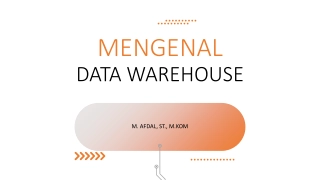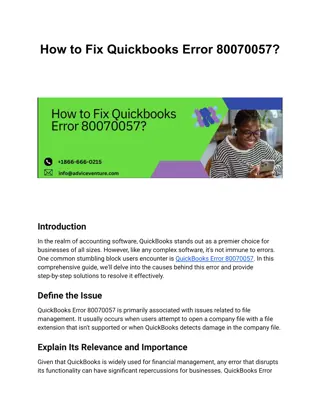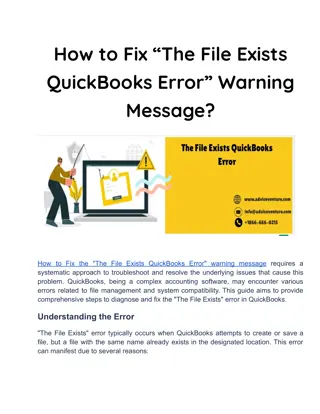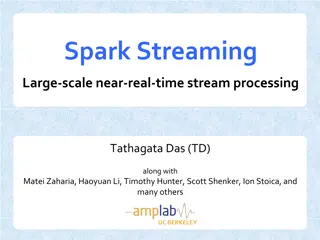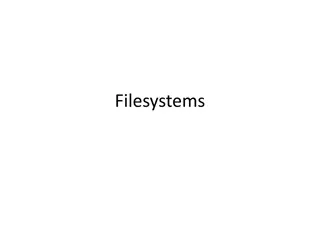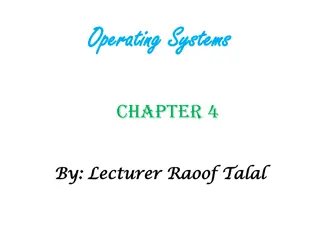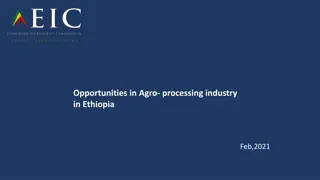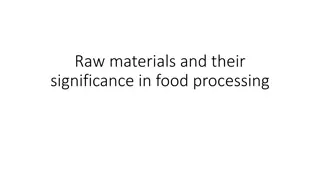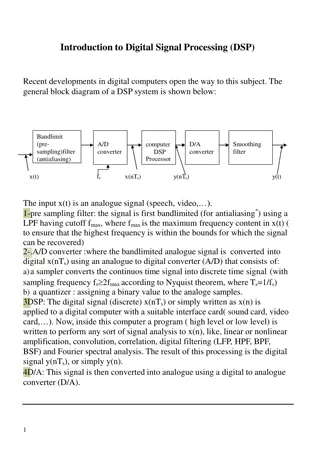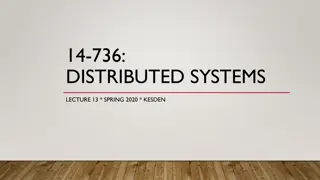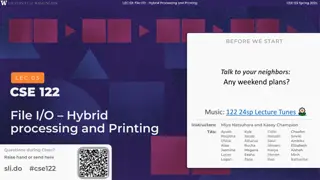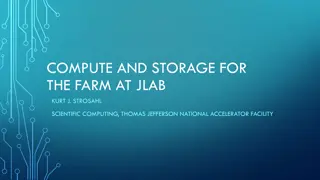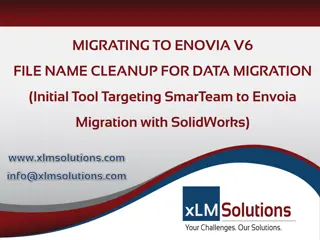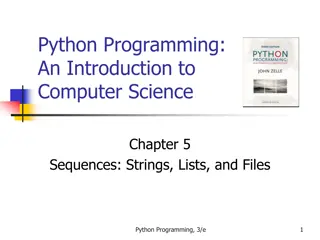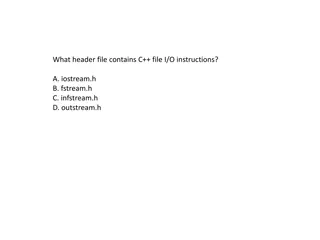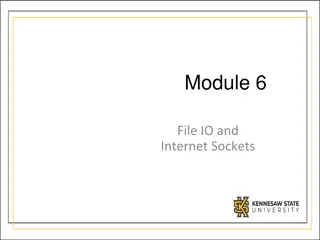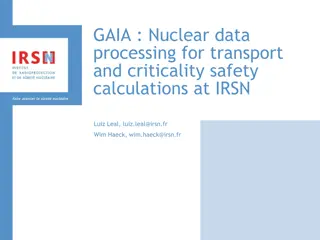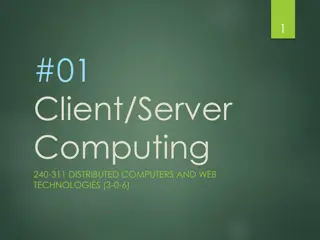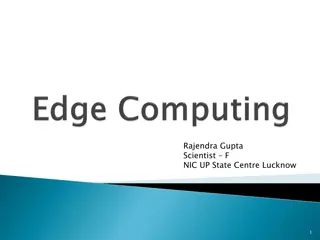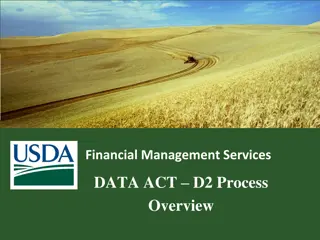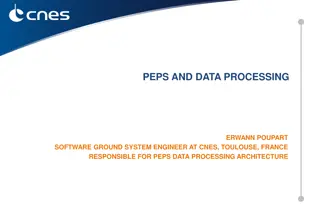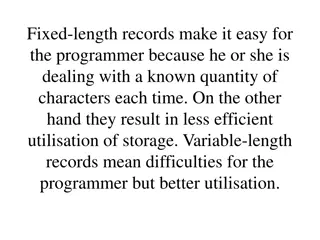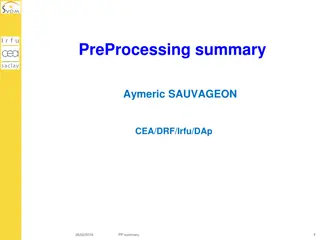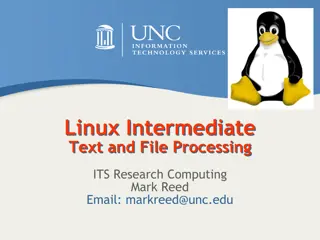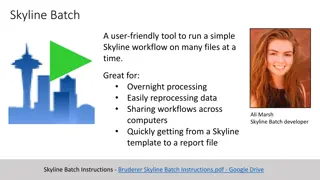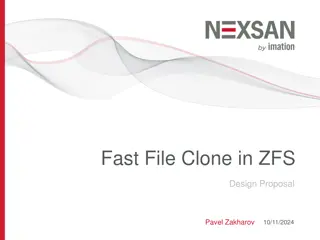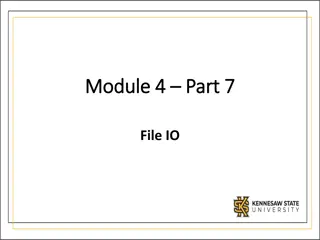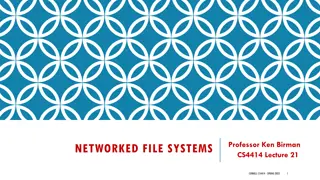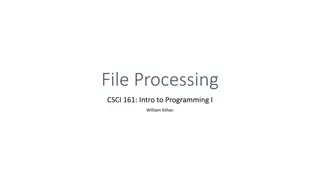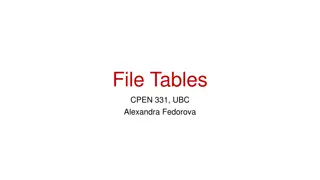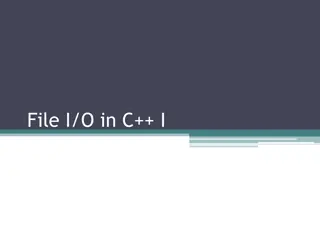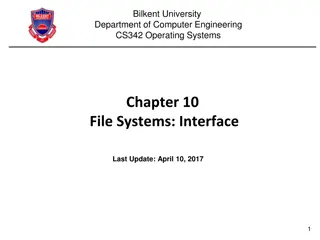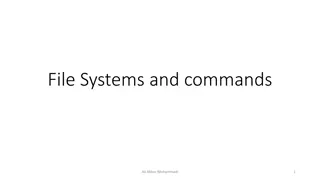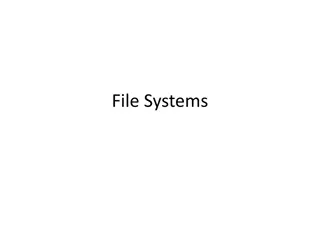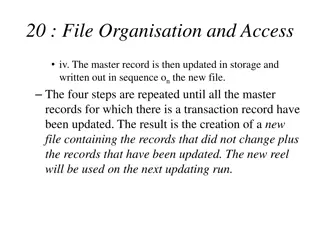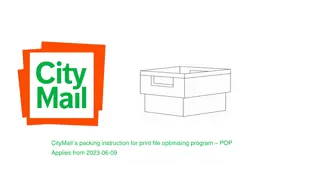MENGENAL: Data Warehouse
Explore the importance of data, information, and knowledge in computing, evolution of databases, file processing vs. database processing, and the definition of Data Warehouses by Bill Inmon. Learn about structured data storage, database management, and the advantages of using databases over file pro
3 views • 19 slides
National Food Processing Policy and Its Importance
National Food Processing Policy aims to address the significant wastage in food production through value addition and efficient processing. The policy highlights the reasons for food processing, including reducing losses in the supply chain and enhancing quality. It emphasizes creating an enabling e
1 views • 19 slides
How to Fix Quickbooks Error 80070057?
How to Fix Quickbooks Error 80070057?\nQuickBooks Error 80070057 can disrupt financial management. It occurs due to file extension issues or data damage. Symptoms include inability to open files and error code display. Causes involve incorrect file extensions or firewall settings. Diagnostic tools l
1 views • 5 slides
How to Fix “The File Exists QuickBooks Error” Warning Message
How to Fix the \"The File Exists QuickBooks Error\" warning message requires a systematic approach to troubleshoot and resolve the underlying issues that cause this problem. QuickBooks, being a complex accounting software, may encounter various errors related to file management and system compatibil
0 views • 5 slides
Introduction to Spark Streaming for Large-Scale Stream Processing
Spark Streaming, developed at UC Berkeley, extends the capabilities of Apache Spark for large-scale, near-real-time stream processing. With the ability to scale to hundreds of nodes and achieve low latencies, Spark Streaming offers efficient and fault-tolerant stateful stream processing through a si
0 views • 30 slides
Understanding Filesystems: A Comprehensive Overview
File systems provide a structured approach to storing and organizing data on secondary storage devices. They involve logical organization of files, directories for grouping related files, sharing data between users, and managing permissions. Files contain data with attributes like size, ownership, a
3 views • 29 slides
Implementation of File System in Operating Systems
Various structures, such as boot control blocks and directory implementations, play a crucial role in implementing a file system in operating systems. These structures help in managing disk and in-memory data efficiently, ensuring effective file storage and retrieval. Linear lists and hash tables ar
1 views • 22 slides
Opportunities in Ethiopia's Agro-Processing Industry
Ethiopia stands out as a leader in raw material production for agro-processing industries, offering opportunities in dairy, juice processing, edible oil processing, poultry, beef production, and tomato processing. With abundant resources, suitable climate conditions, and a growing domestic market, E
0 views • 8 slides
Significance of Raw Materials in Food Processing
Effective selection of raw materials is crucial for ensuring the quality of processed food products. The quality of raw materials directly impacts the final products, making it important to procure materials that align closely with processing requirements. Quality evaluation, including microbiologic
2 views • 30 slides
Understanding MapReduce and Hadoop: Processing Big Data Efficiently
MapReduce is a powerful model for processing massive amounts of data in parallel through distributed systems like Apache Hadoop. This technology, popularized by Google, enables automatic parallelization and fault tolerance, allowing for efficient data processing at scale. Learn about the motivation
2 views • 33 slides
Overview of Digital Signal Processing (DSP) Systems and Implementations
Recent advancements in digital computers have paved the way for Digital Signal Processing (DSP). The DSP system involves bandlimiting, A/D conversion, DSP processing, D/A conversion, and smoothing filtering. This system enables the conversion of analog signals to digital, processing using digital co
1 views • 24 slides
Understanding Distributed File Systems
A distributed file system manages files across multiple machines on a network, providing users with a seamless experience as if they were using a local file system. This system abstracts details such as file locations, replicas, and system failures from the user, ensuring efficient and reliable file
0 views • 35 slides
File I/O Processing and Printing in CSE 122 Spring 2024
LEC.03 covers File I/O Hybrid Processing and Printing in the CSE 122 course for Spring 2024. The lecture outlines the use of scanners with strings, hybrid approach, and files along with using PrintStream for file output. Important announcements regarding Programming Assignment 0 (P0) and Creative Pr
3 views • 26 slides
Compute and Storage Overview at JLab Facility
Compute nodes at JLab facility run CentOS Linux for data processing and simulations with access to various software libraries. File systems provide spaces like /group for group software, /home for user directories, and Cache for write-through caching. Additionally, there are 450TB of cache space on
0 views • 11 slides
ENOVIA V6 File Name Cleanup for Data Migration
Problematic file names with unsupported characters can hinder data migration into ENOVIA V6, impacting object busname, titles, and filenames. This article proposes a solution involving filename changes, database updates, and file vault maintenance. The methodology includes SQL queries for analysis,
0 views • 5 slides
Introduction to Python Programming: Strings, Lists, and Files
This chapter delves into the fundamental concepts of Python programming related to sequences, specifically focusing on strings, lists, and file processing. It covers the representation of strings, various operations that can be performed on them, basic ideas of sequences and indexing for strings and
0 views • 109 slides
The Power of Unix Command Line Basics for Text Processing in Bioinformatics
Unix Shell commands such as sort, cut, uniq, join, paste, sed, grep, awk, wc, diff, comm, and cat are essential for text processing in bioinformatics. These tools allow seamless manipulation of text data without the need for intermediate files, making file processing efficient and powerful. By pipin
0 views • 19 slides
Understanding C++ File I/O Operations
Learn about C++ file I/O operations, including input/output instructions, file handling with ifstream and ofstream, opening multiple files, checking end of file, and a review of the file I/O process. Discover how to write to an ASCII file and read data from it in C++ programming. Practice with examp
0 views • 47 slides
Understanding File Input/Output in Java
Learn about file input/output operations in Java. Explore how to read and write data to files, handle exceptions using try/catch, work with streams, understand the process of file handling, and examine file structure examples like storing airline data. Enhance your Java programming skills by masteri
0 views • 41 slides
GAIA Nuclear Data Processing Overview
GAIA is a software framework for nuclear data processing used for transport and criticality safety calculations. It offers features like library QA procedures, validation of neutronic simulations, processing using NJOY wrapper, and making application libraries. The tool can read/write various file f
0 views • 22 slides
Understanding Client/Server Computing Architecture
Client/Server Computing architecture separates clients and servers over a network, allowing for file sharing, resource allocation, and service requests. Clients initiate services from servers, with transparent server locations and message-passing transactions. Systems with C/S architecture include f
0 views • 18 slides
Understanding Edge Computing for Optimizing Internet Devices
Edge computing brings computing closer to the data source, minimizing communication distances between client and server for reduced latency and bandwidth usage. Distributed in device nodes, edge computing optimizes processing in smart devices instead of centralized cloud environments, enhancing data
0 views • 32 slides
Data Act Reporting and Financial Management Overview
The Digital Accountability and Transparency Act (DATA Act) of 2014 aims to enhance transparency in federal expenditures. It directs the government to standardize and publish various financial reports and data compilations related to obligations, spending, payments, budget actions, procurement, and a
0 views • 16 slides
Insight into PEPS Data Processing Architecture by Erwann Poupard
Erwann Poupard, a Software Ground System Engineer at CNES, Toulouse, France, plays a crucial role in the PEPS data processing architecture. The outline covers PEPS HPSS data storage statistics, current data processing trends, and future plans including PEPS V2 development. Explore PEPS processing ch
0 views • 8 slides
New Features and Enhancements in GTAS 2.5 Bulk File Upload Process
Explore the revamped Bulk File Upload process in GTAS 2.5, including improved navigation, new menu options, and a comprehensive ATB Bulk File Processing Status dashboard for tracking file uploads and processing statuses efficiently.
0 views • 27 slides
Understanding File Characteristics and Efficient Storage Methods
Fixed-length records simplify programming by dealing with a known quantity of characters each time but result in less storage efficiency. Variable-length records offer better storage utilization despite posing challenges for programmers. Apart from hit rate and activity, file characteristics like vo
0 views • 11 slides
Data Processing and Preprocessing Summary
In this document, Aymeric Sauvageon from CEA/DRF/Irfu/DAp presents a detailed overview of the preprocessing steps involved in data processing from L0 to L1. It covers the definition of L0/L1 and coding, utilization of the database for processing, input file specifications from China, packet content
0 views • 11 slides
Comprehensive Guide on Linux Intermediate Text and File Processing
Explore a detailed course on Linux intermediate text and file processing, covering essential commands, tools, topics, and logistics for post-processing data files. Delve into topics like stdout, stdin, stderr, piping, and redirection. Enhance your skills with practical lab exercises and advance your
0 views • 67 slides
Efficient Skyline Batch Workflow Tool for Processing Multiple Files
Utilize Skyline Batch, a user-friendly tool developed by Ali Marsh, to run simple Skyline workflows on multiple files efficiently. This tool is ideal for overnight processing, reprocessing data easily, and sharing workflows across different computers. Quickly transform Skyline templates into report
0 views • 4 slides
Fast File Clone in ZFS Design Proposal Overview
This document details a proposal for implementing fast file clone functionality in ZFS, allowing for nearly instant file copying through referencing. The motivation behind this proposal includes support for VMware VAAI, NAS Full File Clone, and Fast File Clone to save memory and disk space. The prop
0 views • 29 slides
Understanding File Input/Output in Python Programming
Exploring the basics of File I/O (Input/Output) in Python, including reading from and writing to text files. Learn how to read all content from a file as a string or a list, and how to write data to a file using Python's file handling capabilities.
0 views • 12 slides
Evolution of Networked File Systems in Computer Science
The evolution of networked file systems in the computer science field has been pivotal in enabling remote file storage, distributed coordination, and improved system stability. Starting from Bill Joy's innovations in the BSD version of Unix to the introduction of NFS by Sun Microsystems, the concept
0 views • 55 slides
Understanding File Processing and Input/Output Operations in Java
Gain insights into file processing and I/O operations in Java programming, covering topics such as file handling, reading files, file paths, compiler errors, exceptions, and the 'throws' clause. Learn how to work with files, handle errors effectively, and optimize your code for efficient file manage
0 views • 41 slides
Understanding File System Calls and Operations in Operating Systems
Explore the concepts of file system calls, opening files, reading from files, setting file offsets, closing files, and maintaining file states in an operating system. Learn how to interact with files efficiently while understanding the underlying mechanisms and necessary actions for file handling.
0 views • 21 slides
Understanding File Input/Output (I/O) in C++
File Input/Output (I/O) is an essential concept in C++ programming, allowing for interaction with files stored on secondary storage devices. This involves steps like including the fstream header file, declaring file stream variables, associating them with input/output sources, opening the file, perf
0 views • 19 slides
Understanding File Systems in Operating Systems
File systems are essential components of operating systems that manage the organization, storage, and retrieval of files. This content explores the function of file systems, their interfaces, design tradeoffs, file concepts, attributes, and structures. It covers topics such as access methods, direct
0 views • 49 slides
Understanding File Systems: File Naming, Extensions, and Structure
File systems and commands play a crucial role in managing information on disks while shielding users from the complexities of storage mechanisms. This article delves into the rules of file naming, distinctions between upper and lower case letters, file extensions indicating file types, and the under
0 views • 85 slides
Understanding File System Design Challenges and Options
Exploring the complexities of file system design, this content delves into various aspects such as file layout, design constraints, data structures, design challenges, options like FAT, FFS, NTFS, and more. It discusses the challenges of locating file blocks, index granularity, free space management
0 views • 33 slides
Sequential File Maintenance and Organisation Process
In sequential file maintenance, the master records are updated and written to a new file in sequence after processing transaction records. This process continues until all relevant master records are updated, resulting in a new file with unchanged and updated records. Additional steps involve file s
0 views • 7 slides
Optimizing Print File Packing Instructions for CityMail Program
In the CityMail program effective from June 9, 2023, the print file optimizing process involves several steps such as file processing, sorting, production file enhancements, and bundling for efficient handling. Various codes and keys are used to streamline the process, ensuring the accurate bundling
0 views • 9 slides
